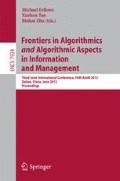Abstract
In this paper, we first summarize the attacks on the existing arbitrated quantum signature (AQS) schemes and then present a valid forgery attack. Also, we discuss the effectiveness of these attacks and analyze the reasons for these schemes suffered attacks. Moreover, we propose an AQS scheme which can resist all existent attacks. The proposed AQS scheme can preserve all merits in the previous AQS schemes such as it can sign the known and unknown quantum messages. To achieve higher security of AQS, we also construct a strong quantum one-time pads encryption which is applied to improve the AQS schemes.
Access this chapter
Tax calculation will be finalised at checkout
Purchases are for personal use only
Preview
Unable to display preview. Download preview PDF.
References
Aharonov, D., Ben-Or, M.: Fault-tolerant quantum computation with constant error. In: Proceedings of the twenty-ninth Annual ACM Symposium on Theory of Computing, pp. 176–188. ACM (1997)
Barnum, H., Crépeau, C., Gottesman, D., Smith, A., Tapp, A.: Authentication of quantum messages. In: Proceedings of the 43rd Annual Symposium on Foundations of Computer Science, pp. 449–458. IEEE (2002)
Bennett, C.H.: Quantum cryptography using any two nonorthogonal states. Physical Review Letters 68(21), 3121–3124 (1992)
Bennett, C.H., Brassard, G.: Quantum cryptography: Public key distribution and coin tossing. In: Proceedings of IEEE International Conference on Computers, Systems and Signal Processing, pp. 175–179. IEEE (1984)
Boyer, M., Gelles, R., Kenigsberg, D., Mor, T.: Semiquantum key distribution. Physical Review A 79(3), 032341 (2009)
Boyer, M., Kenigsberg, D., Mor, T.: Quantum key distribution with classical Bob. Physical Review Letters 99(14), 140501 (2007)
Boykin, P.O., Roychowdhury, V.: Optimal encryption of quantum bits. Physical Review A 67(4), 042317 (2003)
Briegel, H.J., Dür, W., Cirac, J.I., Zoller, P.: Quantum repeaters: The role of imperfect local operations in quantum communication. Physical Review Letters 81(26), 5932–5935 (1998)
Buhrman, H., Cleve, R., Watrous, J., De Wolf, R.: Quantum fingerprinting. Physical Review Letters 87(16), 167902 (2001)
Cai, Q.Y.: Eavesdropping on the two-way quantum communication protocols with invisible photons. Physics Letters A 351(1), 23–25 (2006)
Choi, J.W., Chang, K.Y., Hong, D.: Security problem on arbitrated quantum signature schemes. ArXiv:quant-ph/1106.5318 (2011)
Curty, M., Lütkenhaus, N.: Comment on“Arbitrated quantum-signature scheme”. Physical Review A 77(4), 046301 (2008)
Curty, M., Santos, D.J., Pérez, E., García-Fernández, P.: Qubit authentication. Physical Review A 66(2), 022301 (2002)
Deng, F.G., Zhou, P., Li, X.H., Li, C.Y., Zhou, H.Y.: Robustness of two-way quantum communication protocols against trojan horse attack. ArXiv:quant-ph/0508168 (2005)
Duan, L.M., Lukin, M.D., Cirac, J.I., Zoller, P.: Generation of nonclassical photon pairs for scalable quantum communication with atomic ensembles. Nature 414, 413 (2001)
Ekert, A.K.: Quantum cryptography based on Bell’s theorem. Physical Review Letters 67(6), 661–663 (1991)
Gao, F., Qin, S.J., Guo, F.Z., Wen, Q.Y.: Cryptanalysis of the arbitrated quantum signature protocols. Physical Review A 84(2), 022344 (2011)
Gisin, N., Ribordy, G., Tittel, W., Zbinden, H.: Quantum cryptography. Reviews of Modern Physics 74(1), 145–195 (2002)
Hwang, T., Luo, Y.P., Chong, S.K.: Comment on “Security analysis and improvements of arbitrated quantum signature schemes”. Physical Review A 85(5), 056301 (2012)
Inamori, H., Lütkenhaus, N., Mayers, D.: Unconditional security of practical quantum key distribution. The European Physical Journal D: Atomic, Molecular, Optical and Plasma Physics 41(3), 599–627 (2007)
Kwiat, P.G., Mattle, K., Weinfurter, H., Zeilinger, A., Sergienko, A.V., Shih, Y.: New high-intensity source of polarization-entangled photon pairs. Physical Review Letters 75(24), 4337–4341 (1995)
Lau, F., Rubin, S.H., Smith, M.H., Trajkovic, L.: Distributed denial of service attacks. In: 2000 IEEE International Conference on Systems, Man, and Cybernetics, vol. 3, pp. 2275–2280. IEEE (2000)
Li, Q., Chan, W.H., Long, D.Y.: Arbitrated quantum signature scheme using Bell states. Physical Review A 79(5), 054307 (2009)
Lo, H.K., Chau, H.F.: Unconditional security of quantum key distribution over arbitrarily long distances. Science 283(5410), 2050 (1999)
Mayers, D.: Unconditional security in quantum cryptography. Journal of the ACM (JACM) 48(3), 351–406 (2001)
Shor, P.W.: Fault-tolerant quantum computation. In: Proceedings of the 37th Annual Symposium on Foundations of Computer Science, pp. 56–65. IEEE (1996)
Shor, P.W., Preskill, J.: Simple proof of security of the BB84 quantum key distribution protocol. Physical Review Letters 85(2), 441–444 (2000)
Sun, Z., Du, R., Long, D.: Improving the security of arbitrated quantum signature protocols. ArXiv:quant-ph/1107.2459 (2011)
Zeng, G.: Reply to “Comment on ‘Arbitrated quantum-signature scheme’ ”. Physical Review A 78(1), 016301 (2008)
Zeng, G., Keitel, C.H.: Arbitrated quantum-signature scheme. Physical Review A 65(4), 042312 (2002)
Zou, X., Qiu, D.: Security analysis and improvements of arbitrated quantum signature schemes. Physical Review A 82(4), 042325 (2010)
Zou, X., Qiu, D., Li, L., Wu, L., Li, L.: Semiquantum-key distribution using less than four quantum states. Physical Review A 79(5), 052312 (2009)
Author information
Authors and Affiliations
Editor information
Editors and Affiliations
Rights and permissions
Copyright information
© 2013 Springer-Verlag Berlin Heidelberg
About this paper
Cite this paper
Zou, X., Qiu, D. (2013). Arbitrated Quantum Signature Schemes: Attacks and Security. In: Fellows, M., Tan, X., Zhu, B. (eds) Frontiers in Algorithmics and Algorithmic Aspects in Information and Management. Lecture Notes in Computer Science, vol 7924. Springer, Berlin, Heidelberg. https://doi.org/10.1007/978-3-642-38756-2_8
Download citation
DOI: https://doi.org/10.1007/978-3-642-38756-2_8
Publisher Name: Springer, Berlin, Heidelberg
Print ISBN: 978-3-642-38755-5
Online ISBN: 978-3-642-38756-2
eBook Packages: Computer ScienceComputer Science (R0)

